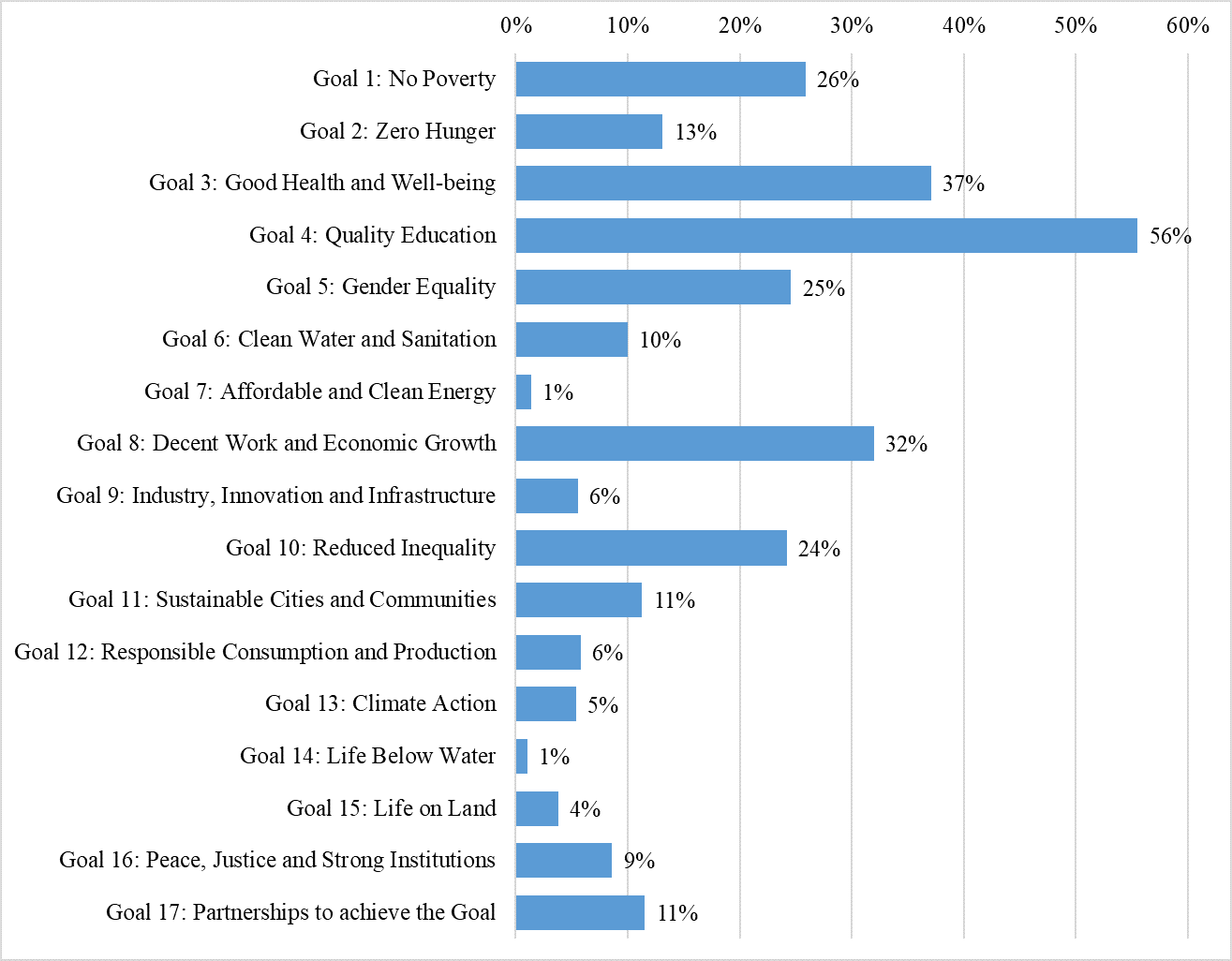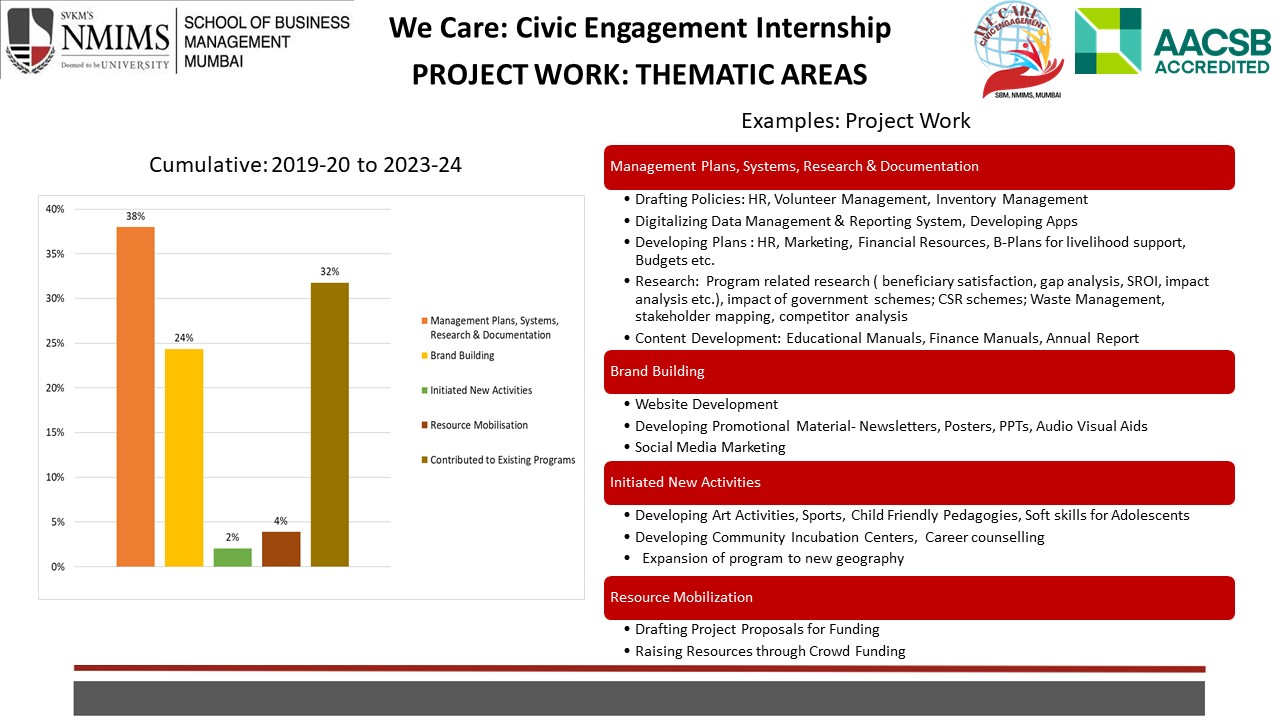Title of the Practice:
Promoting Sustainability through Community Engagement - We Care: Civic Engagement Internship
Objectives
- To foster analytical skills among students to analyze the root causes of social issues and examine the cascading impacts of social problems on society.
- To create abilities to be socially sensitive and inclusive.
- To apply management logic and use critical thinking skills in proposing innovative solutions to address social issues.
Principles:
- Equity and Inclusion: Recognizing the importance of diverse voices and perspectives in creating effective solutions.
- Problem-Solving and Action: Developing research and critical thinking skills to understand and reflect on complex issues. Identifying community needs, potential solutions for social issues, and learning to advocate for social change.
- Collaboration and Teamwork: Developing skills to build strong relationships and trust to work effectively with a diverse range of stakeholders.
Outcomes: 'We Care: Civic Engagement' internship develops an immersive experience in building perspectives and competencies in applying management tools to address societal challenges. It augurs students' optimism to build an inclusive and sustainable global economy.
Context
At the turn of the millennium, the world's nations adopted MDGs to combat global poverty and reduce inequities. The 2008 global financial meltdown, alongside the climate change crisis, social unrest, and demand for transparency in governance, moved ESG issues to the core of business decision-making. Like its global peers in India, inclusivity, equity, and environmental sustainability became focused issues due to existing disparities and their effect on human well-being and prosperity. Consequently, the government of India mandated businesses to integrate social, environmental, and human development concerns in their value chain and recognize the community's relevance as a stakeholder. All schools at NMIMS have a social responsibility forum and undertake various activities all through the year.
The School of Business Management (SBM) NMIMS is one of the leading institutions in Management Education. Since 2004, SBM has embedded sustainability-related issues in its MBA curriculum. In alignment with its mission to create socially responsible managers, the School progressively offered specialized courses and experiential learning experiences anchored around ESG issues.
To further strengthen its commitment to sustainability, SBM instituted the Jasani Centre for Social Entrepreneurship & Sustainability Management in 2010. The Centre focussed on creating socially adept managers and transformational leaders by formally engaging them in designing creative solutions to the social agenda. This was driven by the belief that such exposure would be instrumental in developing values of inclusion, compassion, and resilience and inspire them to create an inclusive and sustainable world. Given this context, since 2010, SBM has incorporated a three-week '‘We Care: Civic Engagement ' internship as a non-credit but compulsory component of the first-year MBA program.
The Practice
The three-week 'We Care: Civic Engagement' internship is scheduled in the third trimester of the MBA program. Students are placed in social sector organizations at the pan-India level for 150 man-hours over three weeks. To strengthen the service delivery system of the organizations, students work on projects such as developing management plans, systems, digitization, resource mobilization, research, etc, and align their work to relevant SDGs.
Methodology
The internship process includes onboarding 250-300 social sector organizations needing management interns, profiling students, sharing their CVs, and finding a strategic fit between students' aspirations and skill sets with the organization's requirements. To familiarize students with the internship requirements capacity-building workshops are held, students are encouraged to go for pre-internship visits. Organizational and faculty mentors are appointed to mentor students. To integrate experiential learning with academics, each faculty member mentors 12-15 students.
Fig 1 - SOP for We Care Internship
In the first week of internship, post-induction students brainstorm with the staff to finalize their proposed action plan. The next ten days are allotted to project execution. In the last three days, students draft and present their reports. Faculty mentors use weekly reports and a 'Rubric' to assess students. Class discussions, We Care poster presentations, competitions on We Care documentaries, photo stories, and We Innovate B-plans further strengthen the sustainability dimension. Formal feedback from students, organizations, and faculty mentors helps review and revise the internship components. Experiential learning is also captured in the Annual We Care Anthology.
The validity of the 'We Care: Civic Engagement' internship lies in understanding that sustainability issues today are at the forefront of the business agenda. The recognition that ethical crises and environmental problems located in a single nation or organization are magnified in a global society has led to a greater emphasis on the moral leadership of business leaders. We Care Civic engagement internships have introduced a new dimension, encouraging students to think beyond personal gain and contribute to the betterment of their communities. They provide a valuable opportunity to apply classroom learning to real-world situations. Students can see how policy decisions, social issues, and community needs play out on the ground. While technical skills are important, employers increasingly value transferable skills like communication, collaboration, critical thinking, and problem-solving. Civic engagement internships offer a fertile ground to develop these skills through working with diverse stakeholders, managing projects, and advocating for change.
Such internships offer a unique and valuable experience for students in Indian Higher Education. By promoting social responsibility, practical learning, and active citizenship, these internships can contribute to a more engaged and civically-minded future generation.
Evidence of Success
Between 2019-20 and 2023-2024, 3700 SBM students have interned across 25 States/4 Union territories in over 500 organizations and two international countries (Nepal & Bangladesh). In the last five years, our students have interned with Development Organizations working for Child Welfare, Community Development, Economic Empowerment, etc. (See Fig 2).
Fig 2 - Typology of Development Organizations: 2019-20- 2023-24
Students aligned their projects with various SDGs. Most of the projects were aligned with SDG 4- Quality Education (56 %), SDG 3- Good Health and Well-being (37 %), and SDG 8- Decent Work and Economic Growth (32 %) (See Fig 3). Refer Fig 4 for Types of Projects undertaken by students.
Fig 3 - Alignment of SDGs with Projects: 2019-20 to 2023-24
Fig 4 - Types of Projects Undertaken by Students
Feedback data indicates that 97 % of students had a great learning experience. Besides social sensitivity, students developed critical thinking and problem-solving skills. One team shared, "We are happy that our financial literacy module helped adolescent entrepreneurs. Subsequent class discussions unfolded how managers can create value for all in society." Experiential learning has augmented the intellectual capital of students and faculty publications ( research/case studies) around the SDGs.
"Students have novel ideas and skills in executing the tasks," shared one organizational mentor. 88 % of organizations were highly satisfied with our students. 50 % of our students offered support in digitalizing processes, technology transfer, augmenting plans, and impacting the organization's service delivery systems and reach. Over 1/5th of the students enhanced the digital presence, impacting the organization's brand visibility and funding support.
Recruitment firms feel that social engagement has influenced students to be inclusive and accommodate diversity.
We have received several accolades for our experiential learning model. The latest being the Social Innovation Award- (Innovations That Inspire) conferred to us by Association to Advance Collegiate Schools of Business (AACSB) in 2023.
The validation has aided in scaling the internship to seven Campuses/Schools of NMIMS. 40 per cent of our alumni are actively volunteering, and few have become social entrepreneurs. Our mission of creating socially adept managers and transformational leaders to create shared value has gained momentum.
Problems Encountered and Resources Required
|
Problems Encountered |
Solutions |
Resources Required |
|
Prior to internship |
|
|
|
Dealing with anxiety, resistance, and casual attitude of students |
Counseling from faculty mentors and interaction with senior students, pre-placement visits to the NGO, and organizing orientation workshops to help students develop appropriate perceptions. |
Active support from Faculty Members |
|
Locating credible NGOs in interior parts of India |
Networking with UNICEF, UNDP, Pratham, and Childline to locate their partners in the interior areas |
Appointing special staff and faculty members to facilitate placement |
|
Few NGOs are not aware of the skill sets of management students and, hence, are reluctant to place students. |
Explain how management students can help design user-friendly management systems in the organization. Referring them to other NGOs that had previously placed NMIMS students |
Appointing special staff and faculty members to orient NGOs |
|
During Internship |
|
|
|
Discipline of students: Students reluctant to travel for fieldwork |
Designed a Code of Conduct document and disseminated the same. Strict monitoring by the faculty team and weekly logs are to be vetted by the organizational mentor. Informing the students about the consequences of non-completion of We Care tasks given by the NGO can result in them being declared defaulters. This would call for academic action. |
Active support from Faculty Members in monitoring students |
|
Post internship |
|
|
|
Reflection on Learning |
In-depth discussion with faculty mentors on We Care experience, social perceptions, identifying areas of management learning and application. |
Active support from Faculty Members |
A structured approach, actively supported by the Management Team of the Institution as outlined below, ensures a valuable experience for students, partner organizations, and the community.
Plan: Define program goals (student development, community engagement) and partner with local Development Organizations (NGOs/Government/CSR Departments). Gather data from the Development Organization about placement requirements and types of projects that students can undertake.
Design: Create a standard operating procedure highlighting the internship process, internship duration, and mentorship support. Develop a Code of Conduct outlining expectations and protocols.
Promote: Organize special workshops to orient students for social internships and discuss the value add that students and development Organizations can gain through social internships.
Strategic Alignment: Align students' skill sets and interests with Development Organization's requirements.
Support: Provide orientation for students and faculty. Offer workshops on social work ethics and project management.
Monitor and Evaluate: Track progress through meetings and gather feedback to improve the program for future iterations.



